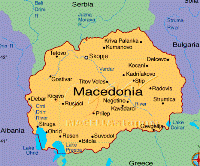Mr Manevski answered most questions submitted in advance by States. Over 40 States took part in the review, with a majority from countries from the region. The major focus of questions related to the rights of ethnic minorities, their representation and integration in society; combat human trafficking. Most States welcomed Macedonia’s report and acknowledged the difficulties faced.
The concerns raised included:
-
Gender Equality and women’s rights. Most States congratulated Macedonia for ratifying the Convention on the Elimination of all Forms of Discrimination against Women but noted that discrimination remains a major concern. The Russian Federation, India, Canada, Austria, Norway, Mexico, Slovenia, the US, and Spain drew attention to such discrimination and gender inequality. Others expressed concern that domestic and other violence against women and children is a persistent and common problem. In response to these concerns the head of delegation underlined that the Former Yugoslav Republic of Macedonia had adopted the law on Equal Opportunities for Women and Men in 2006 and the Criminal Code in 2004 criminalised domestic violence and the Government will continue to implement preventive measures
-
Minorities. Although Mr Manevski noted that Macedonia continues efforts to promote and protect the rights of persons belonging to the non-majority communities, the Russian Federation, India, Austria, Norway, Mexico, Slovenia, UK, Turkey, Ireland, Greece, and France drew special attention to integration of minorities in society, and in particular the involvement of Roma. Many States welcomed the adoption of the National Strategy on the Roma in the Republic of Macedonia and their inclusion in education, housing, public health and employment
-
Prison conditions and rights of detainees. Many States (France, Switzerland, UK, Azerbaijan) raised their concerns about poor prison conditions, cases of mistreatment of detainees, rehabilitation of prisoners, improvement of the penitentiary system and conditions
-
Access to education. Although progress has been made with regard to adapting the legislative framework, Nigeria, India, the Holy See, Belgium, Bosnia and Herzegovina and others noted that access to education for Roma remains limited and recommended more effective measures to promote education. Mr Manevski underlined efforts made by Macedonia in relation of free compulsory education
-
Other issues raised included free elections (Ireland), freedom of expression (Switzerland, Greece), the independence of the judiciary (Slovenia, Poland, Greece).
The Working Group on the UPR adopted the draft report on Macedonia on 15 May 2009. The country took all of the 42 recommendations made to it under consideration and will provide its response by the 12th session of the Council in September 2009. The State delegation stated that many of the recommendations would be accepted, while others were already being implemented.
Related articles:





